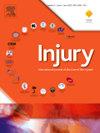关节镜下外侧韧带重建治疗孤立性慢性外侧踝关节不稳,与关节镜下Broström修复和下伸肌视网膜带增强相比,恢复时间更长。
IF 2.2
3区 医学
Q3 CRITICAL CARE MEDICINE
Injury-International Journal of the Care of the Injured
Pub Date : 2025-02-01
DOI:10.1016/j.injury.2024.112082
引用次数: 0
摘要
背景:慢性外侧踝关节不稳(CLAI)患者可以通过关节镜下Broström修复和下伸肌网膜增强或关节镜辅助下半腱肌自体移植物重建外侧韧带进行治疗,患者的功能预后良好。目前尚不清楚一种方法是否会带来更好的结果。回顾性分析前瞻性收集的数据,比较修复和重建的结果。方法:关节镜下Broström修复联合下伸肌网膜增强术治疗CLAI患者(修复/增强组;n=39)和外侧韧带重建(重建组;N =23)例手术,至少随访24个月。评估手术时间、美国骨科足踝学会(AOFAS)评分、Karlsson踝关节功能评分(KAFS)、Tegner评分、距前平移(ATT)、关节主动位置感(AJPS)、患者恢复运动时间。结果:重建组手术时间更长。重建组的患者经历了更多的疼痛。术后3个月,修复/增强组患者获得更好的AOFAS、KAFS、Tegner和AJPS评分。术后6个月,修复/增强组的kfs和AJPS较好。在1年和2年,与修复/增强组相比,重建组患者记录了更好的功能结果(AOFAS和KAFS)。修复/增强组患者恢复运动的平均时间为10.42±7.77周(范围,8-56周),重建组为14.18±5.34周(范围,8-24周)(p = 0.049)。结论:在CLAI患者中,关节镜重建在中期的ATT、AOFAS和KAFS方面有更好的结果;然而,与关节镜Broström修复和下伸肌网膜增强手术相比,术中时间更长,恢复运动延迟,恢复正常踝关节功能所需时间更长。本文章由计算机程序翻译,如有差异,请以英文原文为准。
Arthroscopic lateral ligament reconstruction for isolated chronic lateral ankle instability is associated with longer recovery compared to arthroscopic Broström repair and inferior extensor retinaculum augmentation
Background
Patients with chronic lateral ankle instability (CLAI) can be managed with arthroscopic Broström repair and inferior extensor retinaculum augmentation or arthroscopic assisted lateral ligament reconstruction using ipsilateral semitendinosus autograft, with good functional outcomes in patients. It is unclear whether one offers better outcome that the other. This retrospective analysis of prospectively collected data compared the outcomes of repair and reconstruction.
Methods
Patient treated for CLAI by arthroscopic Broström repair and inferior extensor retinaculum augmentation (Repair/augmentation Group; n=39) and lateral ligament reconstruction (Reconstruction Group; n=23) procedures with a minimum follow-up of 24 months were enrolled. The operative time, American Orthopedic Foot and Ankle Society (AOFAS) scores, Karlsson Ankle Functional Score (KAFS), Tegner score, Anterior Talar Translation (ATT), Active Joint Position Sense (AJPS), and the time of the patients return to sports activities were assessed.
Results
The operative time was longer in the Reconstruction Group. The patients in the Reconstruction Group experienced more pain. At 3 months after surgery, the patients in Repair/augmentation Group gained better AOFAS, KAFS, Tegner, and AJPS scores. At 6 months after surgery, better KAFS and AJPS were observed in Repair/augmentation Group. At 1 and 2 years, patients in the Reconstruction Group recorded better functional outcomes (AOFAS and KAFS) compared to the Repair/augmentation Group. The mean time of the patients return to sports activities was 10.42 ± 7.77 weeks (range, 8-56 weeks) in the Repair/augmentation Group, compared to 14.18± 5.34 weeks (range, 8-24 weeks) in the Reconstruction Group (p = 0.049).
Conclusion
In CLAI patients, arthroscopic reconstruction yields better outcomes in terms of ATT, AOFAS, and KAFS in the mid-term; however, it is associated with a longer intraoperative time, delayed return to sports, and an extended duration to resume normal ankle function compared to the arthroscopic Broström repair and inferior extensor retinaculum augmentation procedure.
求助全文
通过发布文献求助,成功后即可免费获取论文全文。
去求助
来源期刊
CiteScore
4.00
自引率
8.00%
发文量
699
审稿时长
96 days
期刊介绍:
Injury was founded in 1969 and is an international journal dealing with all aspects of trauma care and accident surgery. Our primary aim is to facilitate the exchange of ideas, techniques and information among all members of the trauma team.

 求助内容:
求助内容: 应助结果提醒方式:
应助结果提醒方式:


